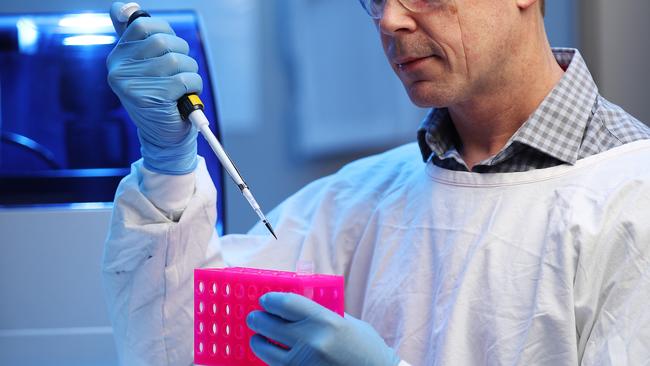Melbourne made nasal spray could help stop coronavirus in cancer patients
A nasal spray aimed to stop coronavirus in cancer patients and other highly vulnerable people is now being rolled out as part of a landmark Melbourne trial.
News
Don't miss out on the headlines from News. Followed categories will be added to My News.
A nasal spray is being rolled out in Melbourne in an attempt to stop coronavirus in cancer patients and other highly vulnerable people who may not be protected by COVID-19 vaccines. The landmark Melbourne trial may also have benefits for the wider population if the spray, developed by Peter MacCallum Cancer Centre, proves to be an effective new weapon against the virus.
It is hoped daily doses of the medication — which contains cancer drug interferon — will prevent infections from most other viruses too, such as influenza and the common cold.
Professor Monica Slavin, Director of Infectious Diseases at Peter Mac and the National Centre for Infections in Cancer, said it had the potential to become one of “multiple approaches” to help protect vulnerable people from the coronavirus.
“The idea of the spray is to prevent the virus from getting a foothold in the respiratory tract and stopping it from invading the body,” Prof Slavin said.
“We know from other vaccines … when your immune system is low you tend not to respond [to them] as well as the rest of the population. But having an additional precaution would help put people’s minds at ease.”
The nasal treatment works by suppressing the virus’ ability to duplicate, fighting it off before it has a chance to take hold.

This is important as people who are immunocompromised, such as those undergoing cancer treatment, can’t always generate the virus-fighting antibodies needed for a vaccine to work.
Meanwhile the drug interferon, which was trialled in China at the height of the pandemic to help protect healthcare staff from COVID-19, is an antiviral drug that has been used by cancer patients for years.
Prof Slavin and her team are now hopeful the spray could become an easy and effective way of preventing the virus from attacking the most at-risk patients.
“The consequences of COVID are much more severe for this group of people,” Prof Slavin said.
“We know there’s a vaccine coming and we hope it will be very effective, but it hasn’t been well tested in people whose immune systems are compromised.
“The nasal spray … actually improves the immune response and defences against the virus.
“I don’t think we’re trying to say that this is the be all and end all … but it’s good to have options.”
She said if the trial, called C-SMART, was successful “the next step might be to test it in other populations.”
“It’s a huge achievement to get to this phase – it’s quite remarkable from the time we got the grant in April to now be opening a trial by the end of the year,” she said.
“I think we’re going to learn something out of all of these [coronavirus] studies. It’s very positive.”
About 2000 people will be enrolled in the trial which will run for 12 months across Melbourne’s major hospitals and Westmead Hospital in Sydney.
From Thursday, it will open to patients who have had cancer treatment in the last year and will also look at novel ways to treat COVID-19 if a patient does test positive.
For more information or to register your interest, go to www.csmart.com.au




